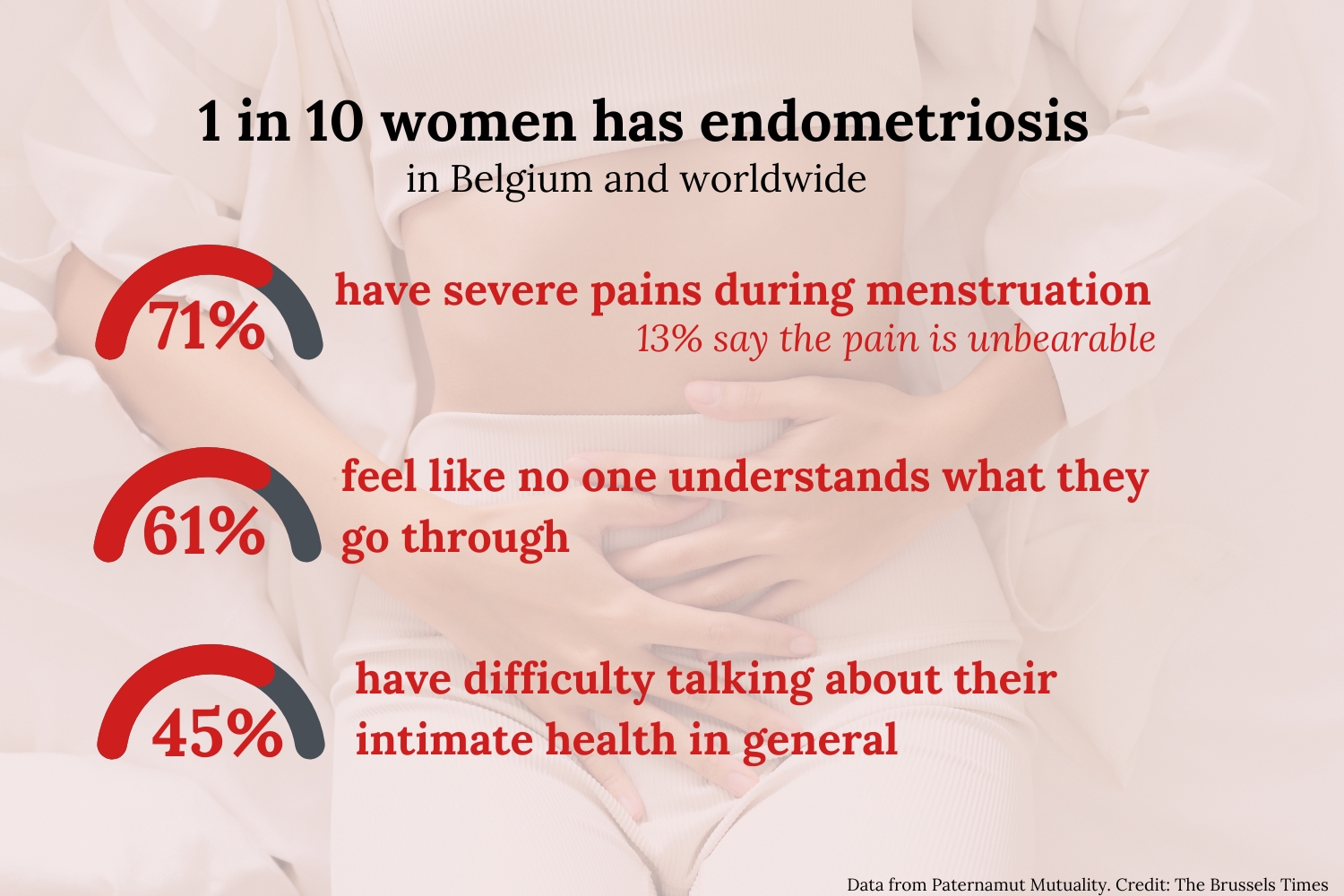Six in ten endometriosis patients feel like their condition is "misunderstood". Half feel like people around them minimise their pain, and 45% have difficulty talking about their intimate health in general, as revealed by a new survey released by the Partenamut mutuality, on the occasion of the World Day Against Endometriosis on 28 March.
The illness affects 1 in 10 women, in Belgium and worldwide, and an unreported number of non-binary, trans and intersex people. Endometriosis is hard to diagnose: it takes an average of seven years from the onset of the symptoms to receive the diagnosis. All the different tests and medical consults performed in this period are rarely reimbursed.
By affecting the uterus, this chronic disease has many life-altering impacts on sufferers, including severe pain during menstruation, chronic pelvic pain, fatigue, infertility, as well as depression and anxiety. Endometriosis occurs when endometrial tissue, which normally lines the inside of the uterus, grows outside of it, explains the World Health Organisation.
"It is difficult to express such intimate pain in the office or among friends,” explains one of the respondents of the survey. “There is no specific treatment, even though alternative medicines help a lot. No psychological follow-up when we really need it (especially to come to terms with the pain, infertility issues, side effects of hormone treatments, etc.).
Respondents also said that these complex pains also lead to other problems (with digestion, headaches, depression, sexual problems) and support is often only surgical or medical, rarely multidisciplinary.
3.400 persons with endometriosis were interviewed for the survey, and 71% reported having severe pains during menstruation, while 13% described the level of pain as unbearable. 80% of respondents dread the start of their period and the side effects it comes with, such as back pains (80%), urinary or digestive disorders (73%) or difficult sexual relations (61%).
3 out of 4 women with endometriosis had to miss work regularly because of their symptoms; making it four times more likely for them to miss work than women who do not have endometriosis, states the Partenamut report.
While most patients (80%) rely on painkillers or anti-inflammatory medicine to cope with the pain, 1 in 2 persons reported also using alternative remedies like hot water bottles, contraception, essential oils or sophrology – a dynamic relaxation method developed by neuropsychiatrist Alfonso Caycedo.
Frequent use of alternative therapies are frequent, as there is no treatment to cure endometriosis, only to manage it. The symptoms are treated with painkillers and/or contraceptive methods, and, in some cases, with surgeries that cut away patches of endometriosis tissue or remove organs affected by it (parts of the colon, appendix or womb). However, It is possible that the disease reoccurs even after surgery. Medical research describes endometriosis as “one of the greatest challenges facing gynaecological surgeons”.
The study concludes that several measures could improve the lives of patients with endometriosis: the reimbursement of alternative therapies for their intimate health, better awareness of menstrual pain and the granting of special leave for work.
We are not crazy We are not lying We are not imagining it
Our pain is REAL 🎗️💛 After the week I’ve had of medical gaslighting, I was even more motivated to attend today’s @wwendomarch in Dublin organised by the fabulous @Kathleen_M_King !#EndoMarch #endometriosis pic.twitter.com/eNIW2Ss01g — Sarah Jane Allen (@SarahJaneVlogs) March 26, 2023
In Belgium, the French-speaking community adopted last year a strategy to improve awareness of the disease, better train medical practitioners and finance more research around endometriosis.
Related News
- A man's place is at work: 20-day paternity leave reinforces parenthood norms
- Period poverty: Free sanitary products to be given to women across Wallonia
- Perfumed menstrual products expose women to allergens
The lengthy diagnosis process has to do with a number of problems, often rooted in sexism: lack of research on diseases that affect the female reproductive system, lack of awareness about endometriosis itself, and the normalisation and minimisation of menstrual pains.
Patients often describe receiving conflicting opinions from doctors, misdiagnoses, or being confronted with carelessness around their symptoms. Since the process can take years, endometriosis may progress unencumbered in the meantime.


